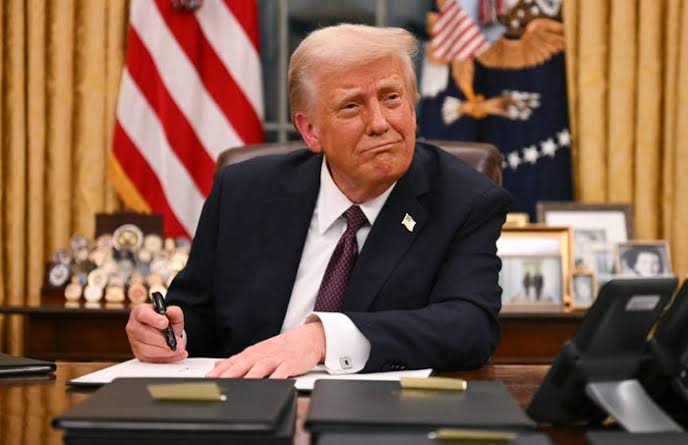BY DR. MUDA YUSUF
The inception of the Trump administration in the United States of America has remarkably changed the dynamics of global trade, global economic outlook and geopolitical trajectory. The US economy is also experiencing a record disruption in its economic, trade and political governance systems. These developments have multi–dimensional implications for the Nigerian economy.
There are immediate and remote consequences forenergy prices, trade relations, economic diplomacy, macroeconomic stability, donor funding and capital flows. These are evolving outcomes of the Trump presidency which would impact the outlook for Nigerian economy in the near term.
IMPLICATIONS FOR ENERGY PRICES
• The United States of America [USA] has been the largest oil producer globally for the past six years. In 2023, for instance, the USA produced an average of 21.91 million barrels per day, which is about 22% of the global oil production. The USA is, therefore, in a good position to influence global oil output and prices.
• The Trump administration has committed to increasing oil output to reduce energy prices in the USA and globally. The country also has the global diplomatic clout to get OPEC to boost oil production. To this end, President Trump has signed an Executive Order creating a National Energy Dominance Council to drive the country’senergy dominance agenda.
• Additionally, the Trump administration is committed to moderating the current global geopolitical tension, especially the Russian-Ukraine war, and possibly the Israeli Hamas war.
• If Trump succeeds in ending the war, especially the Russian-Ukraine war, the prospects for growth in global oil output would be considerably heightened as Russia supplies about 10 mbd of oil to the global oil market. There is also a good chance that the current sanctions on Russia by the USA may be lifted thereafter as the relationship between the two countries normalizes.
• In light of these, the scenario of a weakening ofcrude oil prices in the near term is therefore very high. In this context, the crude oil price benchmark of $75 per barrel in the 2025 budget may not hold. This would impact the outlook for government revenue and foreign exchange earnings in 2025.
• The decision of President Trump to opt out of the Climate change agreement [the Paris Accord] alsohas far reaching consequences for the global oil market. This signals less commitment to climate change concerns and the acceleration of more investment in fossil fuels by the USA. Additionally, the sweeping imposition of trade tariffs on major US trading partners may weaken the global economic growth outlook, dampen global oil demand and depress oil prices.
• However, the upside is that energy prices would drop globally – the price of diesel, PMS Jet fuel, gas etc. This would gladden the hearts of many economic players in the country. The transmission effect would be very fast because of the deregulated regime of the oil and gas sector.
IMPLICATIONS FOR GLOBAL TRADE
• The Trump administration has demonstrated an unequivocal commitment to the ideology of economic nationalism, protectionism, deglobalization, unilateralism and reciprocity. andfragmentation of the global economy. This has unleashed a flurry of retaliatory trade policy actions from a number of countries across a wide range of product groups, even by the close allies of the United States.
• Given the current trade policy disposition of the Trump Administration, AGOA faces the prospect of being terminated. Although Nigeria has very little to show for the opportunities offered by AGOA.
• Meanwhile, the tariff war offers some opportunities for export and investment for Nigeria taking advantage of the gaps that the trade war may create in the countries involved, to the extent that Nigeria is not a victim of the tariff actions.
• There is the prospect of high inflation in the USA as a result of the current tariff war. This thus creates a possibility of imported inflation from the USA for products imported from USA to Nigeria.
• The trade war may create export opportunities to the United States to fill supply gaps that the tariff war may create in the United States. Nigerian companies could position themselves to take advantage of these imminent supply gaps. New bilateral and multilateral trade alliances are likely to evolve due to the ongoing trade war.
• The trade war may trigger a disruption of global supply chains which may adversely affect the global economy, especially from a cost of supplies perspective for imported goods.
• President Trump perceives members of BRICS and their allies as United States adversaries, seeking to reverse the dominance of the dollar in the global financial order. This perception could shape the disposition of the Trump administration towards these countries.
IMPLICATIONS FOR REMITTANCES
• Diaspora remittances may be affected by the current immigration policy of the Trumpadministration. the United States have a huge number of diaspora Nigerians, estimated at 500,000, many of which may be affected by the current immigration policy on documentation.
IMPLICATIONS FOR GOVERNMENT REVENUE
• Heightened prospects of a drop in oil prices would negatively impact government revenue and foreign exchange earnings. This has implications for the outlook for revenue, fiscal deficit, governmentdebt and exchange rate. The current budget benchmark of $75 per barrel may not stand in the circumstances.
IMPLICATIONS FOR EXCHANGE RATE
• The prospects of a strong dollar are very high with the current Trump policies. There is an inverse relationship between the strength of the dollar and that of the other currencies. A stronger dollar willmean a weaker naira. This may result in higherimport costs for domestic investors and invariably become inflationary.
• Current tariff policies of the Trump administration would trigger inflation as costs of imports into the United States surge. The US Federal Reserve would respond by tightening monetary policy which would create a high interest rate scenario in the United Sates. This could result in capital flow reversals, posing a risk to the naira exchange rate.
SUSPENSION OF USAID INTERVENTION
• The value of USAID intervention in Nigeria in 2023 was $1.02 billion. The main areas of intervention were in health, especially HIV/AIDS;water and sanitation, education, maternal and child care and disease prevention. They also have programs to promote democracy and improve governance transparency.
• The suspension and possible termination of the entire aid programme would create significantfinancing gaps for some government programmes, especially in the health sector. Thankfully, the relevant agencies of government are already taking steps to mitigate the steps possible consequences of the termination of USAID programs in these sectors.
POLICY IMPLICATIONS AND LESSONS FROM THE TRUMP DISRUPTION
• There is a need for the government to commit more to the policy of self-reliance and less import dependence in critical areas of the economy, especially energy, food, pharmaceuticals and security. Excessive import dependence poses a major risk to economic and social security of a country.
• A key lesson is from the disruption is that no country should be too dependent on others for its strategic needs. It has once again underscored the risk of overdependence on other countries. The Covid experience offered a similar lesson. Therefore, there is a need to ensure that policies of government are geared towards ensuring economic resilience that minimizes vulnerabilities to external shocks.
• Supply chains should be localized as much as possible.
• The emerging new global order is progressively leaning towards economic nationalism, deglobalization and economic fragmentation. Domestic economic policies must be framed within the context of this reality. Nigeria’s trade and industrial policies are very critical to achieving this resilience.
• The government must deepen backward integrationthrough stronger intentionality to promote domestic production of goods and services as well as export development. The current economic reforms are already on course to ensure strategic structural shifts towards reducing dependence on imports.
• There should be a special emphasis on food security, energy security, health security and internal security, leveraging largely domestic resources.
• The government should urgently address current productivity shortcomings in the real sector to make domestic production competitive domestically and internationally.
• Current global developments reinforce the need to protect domestic industries against unfair competition from imports.
DR MUDA YUSUF
DIRECTOR/CEO
CENTRE FOR THE PROMOTION OF PRIVATE ENTERPRISE [CPPE]
16TH FEBRUARY 2025
Post Views: 293




